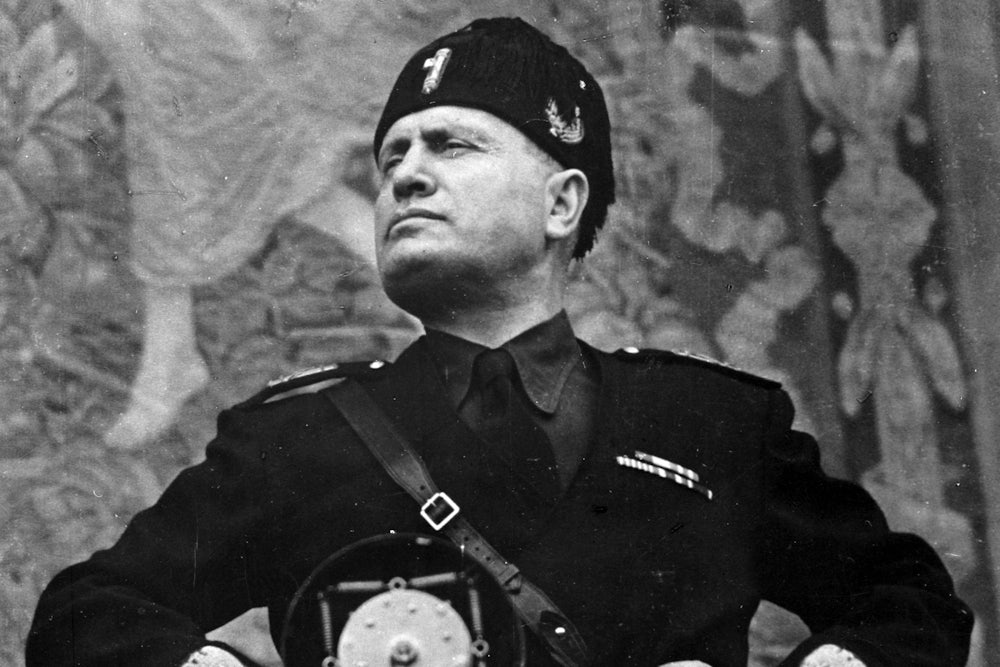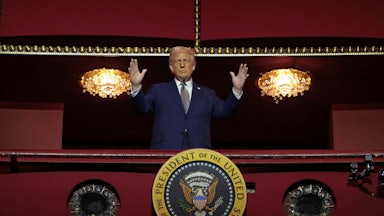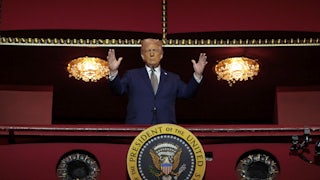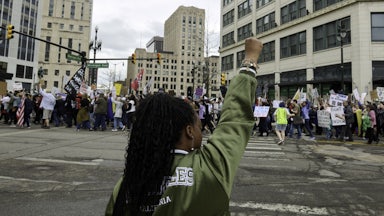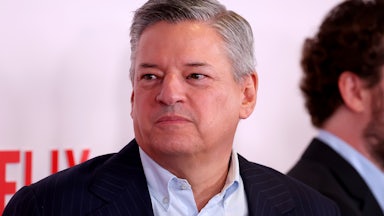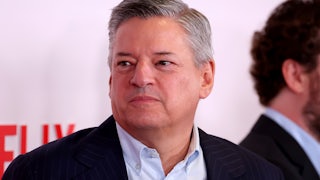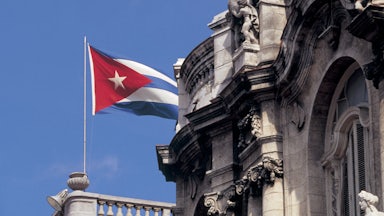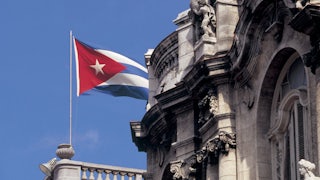The recent worldwide stock market meltdown triggered by Donald Trump’s ill-conceived trade war reminded me of Silvio Berlusconi’s final days as Italy’s prime minister in November 2011, when interest rates on Italian Treasury bonds spiraled exponentially each day to a point where they threatened to cripple the country’s economy. Coming 18 years after Berlusconi’s entrance into politics—and after 18 years of economic stagnation—it was as if the market were screaming: We cannot live with this in power one more day. And so the man who had presented himself as an economic miracle worker was done in by the thing he supposedly understood best: the market.
While the parallels between Berlusconi and Trump are striking—arguably, Berlusconi wrote the playbook for billionaire populism—what we are witnessing in the first three months of the second Trump administration is a populist demagogue morphing into a would-be autocrat. In the process, Trump has taken on a decided resemblance to another Italian politician: Benito Mussolini.
The comparisons between Trump and Berlusconi, who dominated Italian politics between 1993 and 2011, are obvious and help us understand Trump’s initial political ascent and his first term in office. Both made their initial fortune in real estate, were better salesmen than businessmen, and developed a second career in television: Berlusconi as owner of Italy’s three largest private TV networks; Trump as the star of an extremely popular reality TV show. Berlusconi created a new kind of political actor, the media-savvy businessman turned politician who won over working-class voters.
But Berlusconi’s political aims, by comparison, were comparatively modest. Despite his promises of being the Italian Margaret Thatcher, he did not try to remake Italian society or its place in the world and did not pursue a particularly ambitious economic or political agenda. It often seemed his main goals were preserving his financial empire and avoiding criminal prosecution. Berlusconi’s own particular brand of narcissism—the need to be loved and adulated—actually prevented him from becoming the transformative figure he promised. Italy needed deep structural reforms—to the labor market, the pension system, for example. But undertaking them would have required Berlusconi to risk becoming unpopular, which was something he could not stomach.
Trump’s narcissism is very different from Berlusconi’s. Like Mussolini’s, it involves a desire for total dominance and an increasingly unhinged delusion of omnipotence: hence his repeated threats to take over Canada and invade Greenland; to turn Gaza into an American beach resort. Mussolini, like Trump, had a keen instinctive animal cunning that helped him intuit the public mood and vanquish his domestic political opponents. He was a brilliant demagogue who could electrify the crowd and who shrewdly understood and exploited his domestic opponents’ weaknesses.
All this served him well at first. But when he began to move outside of Italy—creating an Italian empire and forcing Italy into World War II—his fundamental provincialism, his deep ignorance of the outside world, and his overestimation of his own instincts over objective facts did him in. After years in power, surrounded by toadies and yes-men, Mussolini began to believe his own rhetoric about Italy’s “eight million bayonets,” preferring to ignore his generals’ warnings that Italy was nowhere near ready to fight a world war. Mussolini was convinced that “national character” mattered more than industrial capacity, causing him to badly underestimate both Britain’s and America’s ability to wage war. Like Trump, Mussolini insisted on taking personal charge of most important negotiations. He insisted on meeting alone with Hitler, relying on his own somewhat shaky German to deal with the Nazi leader, who, not surprisingly, dominated their talks. This is reminiscent of Trump’s personalistic approach to handling Vladimir Putin, in highly secretive, one-on-one meetings that the Russian seems to always get the better of.
Like Trump, Mussolini was an ardent protectionist, adopting a policy of “autarky,” demanding that Italy should consume only products made in Italy. The policy was initially a peevish response to the boycott that other nations leveled at Italy following its unprovoked invasion of Ethiopia. But Mussolini elevated the practice to a central feature of Italian economic policy, even though it did little to improve the standard of living for Italians.
Piqued by Hitler’s military successes, Mussolini impetuously invaded neutral Greece, only to be beaten back by Greek troops and bailed out by a German invasion. Overcoming German reluctance, Mussolini insisted on sending some 200,000 Italian troops to participate in the Nazi invasion of the Soviet Union—because he wanted credit for the defeat of Bolshevism. Never mind that the Italian Army had its hands full in the Balkans and North Africa. The Italian troops were not properly equipped for the Russian winter, and when the invasion failed, Italy lost almost 60 percent of its expeditionary force. Many troops were forced to literally walk back from Russia as much of their motorized transport broke down or was destroyed. When Mussolini’s government fell in 1943, many of these men were captured by their Nazi allies and sent to German concentration camps.
In the first Trump government, he was surrounded by “adult supervision,” experienced members of the political, economic, and military establishment who kept his most dangerous impulses in check. He inherited from Barack Obama an economy in full recovery and pursued the usual Republican formula of tax cuts, which, while adding to the national debt, kept the economy humming. His long-cherished tariff policy was mostly bluster. His mishandling of the pandemic, during which the United States lost more than a million lives, may have cost him reelection.
This conviction of knowing better than the experts was a characteristic of Mussolini’s rule, as well: At different moments, along with being prime minister, Il Duce assumed the Cabinet positions of foreign minister, minister of war, minister of the interior, minister of the navy and the air force, as well as minister of Italian Africa. Trump in his second term has removed anyone who might check his worst instincts and has filled his Cabinet with people whose only real qualification is personal loyalty to the chief.
Having pulled off a miraculous political comeback following his loss to Joe Biden and the disgrace of his attempt to overturn the 2020 election, Trump retook power with an aura of indomitable power. He and many of his supporters literally believed that he had survived an assassination attempt through divine intervention and that he possessed the superpower to Make America Great Again. More cynically, Republican leaders in Congress believed, quite credibly, that he possessed the power to ruin the career of anyone who opposed or criticized him. The Republican Party has thus assumed a cultlike quality. Elon Musk has taken to wearing a hat with the words “Trump Was Right About Everything,” which eerily echoes the fascist slogan “Mussolini Is Always Right.”
The public and many of Trump’s followers mistook his charisma for genuine ability and economic acumen, accepting the fabricated image of Trump as the hero of The Apprentice, master dealmaker, entrepreneur with the infallible Midas touch. In our badly degraded information environment—in which a majority of Americans now get their information from social media and not reliably sourced, factual news—millions of Americans were somehow able to ignore Trump’s abysmal record as a failed businessman as well as his record in office of capricious, autocratic, and reckless behavior that earned him two impeachments. Between 1985 and 1994, as The New York Times reported, Trump lost more money than any single taxpayer in the United States, even as he published his self-congratulatory Art of the Deal.
The past several days have been an Emperor Has No Clothes moment, in which Trump essentially blew up the world’s system of commercial trade, provoking the biggest drop in the stock market since the Covid-19 pandemic paralyzed the world economy. And after the administration was forced to admit that it had unlawfully deported a gainfully employed father of three to a brutal prison in El Salvador, Trump doubled down by rejecting a court order that the government help repatriate Kilmar Abrego Garcia. In fact, Trump insisted on Monday that he’d like to send “homegrown” criminals to CECOT prison, which would become a kind of offshore gulag. He did so during a surreal White House meeting with Salvadoran President Nayib Bukele—who calls himself “the world’s coolest dictator”—in a muscle-flexing show of defiance toward any notion of rule of law.
The public might have initially been confused or impressed by the flurry of nonstop activity of Trump’s first weeks. Seeing it as shock and awe, the unequivocal flunking grade the stock market gave to his trade policy made clear that Trump has no idea what he is doing and is simply making it up as he goes along. The markets in 2011 were essentially screaming their judgment that they had no confidence in Berlusconi’s economic leadership and they could not tolerate his presence a day longer. Falling as it does at the beginning of his term, it will not end Trump’s time in power as it did Berlusconi’s, but it suggests that Trump’s downfall is likely to come not from moral opprobrium but from economic failure and rank incompetence.
Mussolini careened from crisis to crisis—the invasion of Ethiopia, the civil war in Spain, the invasion of Albania and, finally, the entrance into World War II. If his career is any guide, we can expect four years of constant crisis. Autocrats require crisis to justify the extraordinary—and often illegal—measures they take and to distract the public’s attention from the fact that they are not actually improving the lives of ordinary citizens.
